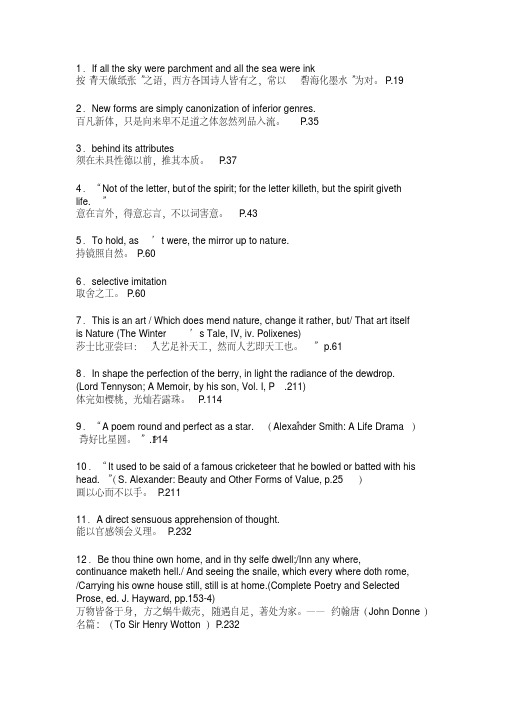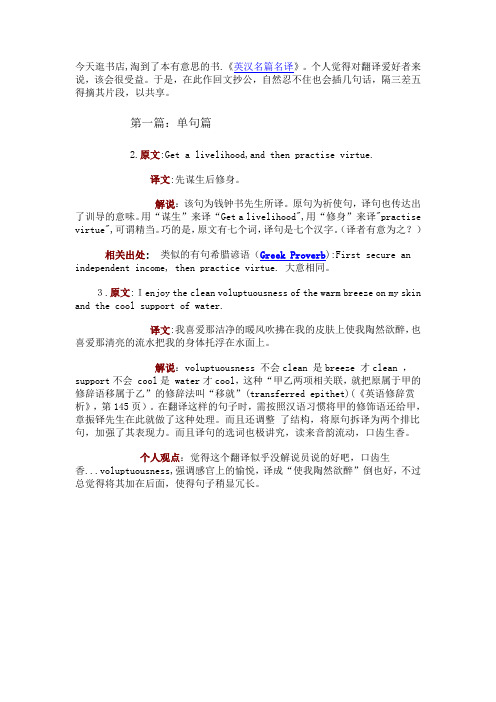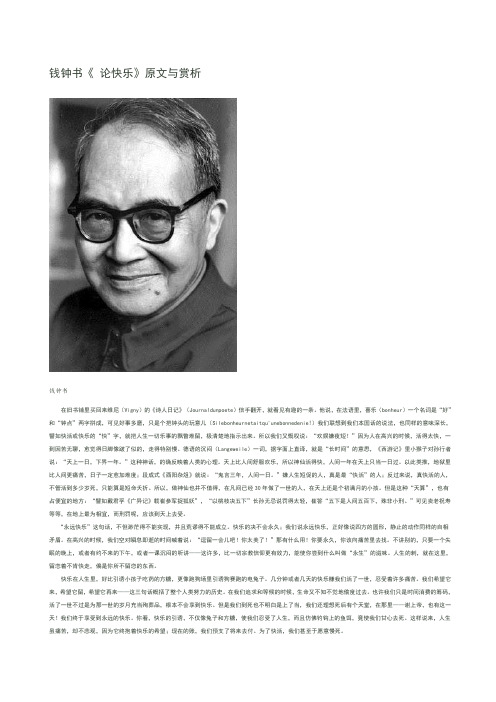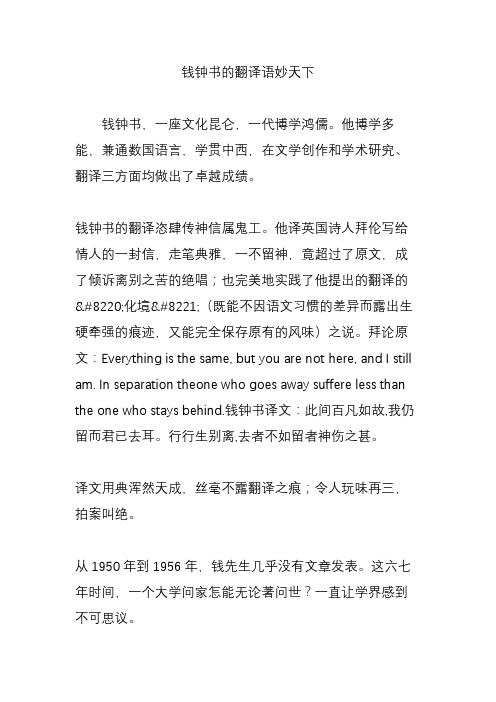钱钟书 经典美文翻译详解
钱钟书翻译经典翻译.pdf

1.If all the sky were parchment and all the sea were ink按“青天做纸张”之语,西方各国诗人皆有之,常以“碧海化墨水”为对。
P.192.New forms are simply canonization of inferior genres.百凡新体,只是向来卑不足道之体忽然列品入流。
P.353.behind its attributes须在未具性德以前,推其本质。
P.374.“Not of the letter, but of the spirit; for the letter killeth, but the spirit giveth life.” 意在言外,得意忘言,不以词害意。
P.435.To hold, as’t were, the mirror up to nature.持镜照自然。
P.606.selective imitation取舍之工。
P.607.This is an art / Which does mend nature, change it rather, but/ That art itselfis Nature (The Winter’s Tale, IV, iv. Polixenes)莎士比亚尝曰:“人艺足补天工,然而人艺即天工也。
”p.618.In shape the perfection of the berry, in light the radiance of the dewdrop.(Lord Tennyson; A Memoir, by his son, Vol. I, P.211)体完如樱桃,光灿若露珠。
P.114(Alexander Smith: A Life Drama)9.“A poem round and perfect as a star. ”“诗好比星圆。
”P.11410.“It used to be said of a famous cricketeer that he bowled or batted with his head. ”(S. Alexander: Beauty and Other Forms of Value, p.25)画以心而不以手。
名篇名译(附名家解读)(2)先谋生后修身

今天逛书店,淘到了本有意思的书.《英汉名篇名译》。
个人觉得对翻译爱好者来说,该会很受益。
于是,在此作回文抄公,自然忍不住也会插几句话,隔三差五得摘其片段,以共享。
第一篇:单句篇2.原文:Get a livelihood,and then practise virtue.译文:先谋生后修身。
解说:该句为钱钟书先生所译。
原句为祈使句,译句也传达出了训导的意味。
用“谋生”来译“Get a livelihood",用“修身”来译"practise virtue",可谓精当。
巧的是,原文有七个词,译句是七个汉字。
(译者有意为之?)相关出处:类似的有句希腊谚语(Greek Proverb):First secure an independent income, then practice virtue. 大意相同。
3.原文:Ienjoy the clean voluptuousness of the warm breeze on my skin and the cool support of water.译文:我喜爱那洁净的暖风吹拂在我的皮肤上使我陶然欲醉,也喜爱那清亮的流水把我的身体托浮在水面上。
解说:voluptuousness 不会clean 是breeze 才clean ,support不会 cool是 water才cool,这种“甲乙两项相关联,就把原属于甲的修辞语移属于乙”的修辞法叫“移就”(transferred epithet)(《英语修辞赏析》,第145页)。
在翻译这样的句子时,需按照汉语习惯将甲的修饰语还给甲,章振铎先生在此就做了这种处理。
而且还调整了结构,将原句拆译为两个排比句,加强了其表现力。
而且译句的选词也极讲究,读来音韵流动,口齿生香。
个人观点:觉得这个翻译似乎没解说员说的好吧,口齿生香...voluptuousness,强调感官上的愉悦,译成“使我陶然欲醉”倒也好,不过总觉得将其加在后面,使得句子稍显冗长。
钱钟书翻译经典翻译

1.If all the sky were parchment and all the sea were ink按“青天做纸张”之语,西方各国诗人皆有之,常以“碧海化墨水”为对。
P.19 2.New forms are simply canonization of inferior genres.百凡新体,只是向来卑不足道之体忽然列品入流。
P.353.behind its attributes须在未具性德以前,推其本质。
P.374.“Not of the letter, but of the spirit; for the letter killeth, but the spirit giveth life.”意在言外,得意忘言,不以词害意。
P.435.To hold, as’t were, the mirror up to nature.持镜照自然。
P.606.selective imitation取舍之工。
P.607.This is an art / Which does mend nature, change it rather, but/ That art itself is Nature (The Winter’s Tale, IV, iv. Polixenes)莎士比亚尝曰:“人艺足补天工,然而人艺即天工也。
”p.618.In shape the perfection of the berry, in light the radiance of the dewdrop. (Lord Tennyson; A Memoir, by his son, Vol. I, P.211)体完如樱桃,光灿若露珠。
P.1149.“A poem round and perfect as a star. ”(Alexander Smith: A Life Drama)“诗好比星圆。
”P.11410.“It used to be said of a famous cricketeer that he bowled or batted with his head. ”(S. Alexander: Beauty and Other Forms of Value, p.25)画以心而不以手。
钱钟书《 论快乐》原文与赏析

钱钟书《论快乐》原文与赏析钱钟书在旧书铺里买回来维尼(Vigny)的《诗人日记》(Journaldunpoete)信手翻开,就看见有趣的一条。
他说,在法语里,喜乐(bonheur)一个名词是“好”和“钟点”两字拼成,可见好事多磨,只是个把钟头的玩意儿(Silebonheurnetaitqu'unebonnedenie!)我们联想到我们本国话的说法,也同样的意味深长,譬如快活或快乐的“快”字,就把人生一切乐事的飘瞥难留,极清楚地指示出来。
所以我们又慨叹说:“欢娱嫌夜短!”因为人在高兴的时候,活得太快,一到因苦无聊,愈觉得日脚像跛了似的,走得特别慢。
德语的沉闷(Langeweile)一词,据字面上直译,就是“长时间”的意思,《西游记》里小猴子对孙行者说:“天上一日,下界一年。
”这种神话,的确反映着人类的心理。
天上比人间舒服欢乐,所以神仙活得快,人间一年在天上只当一日过。
以此类推,地狱里比人间更痛苦,日子一定愈加难度;段成式《酉阳杂俎》就说:“鬼言三年,人间一日。
”嫌人生短促的人,真是最“快活”的人;反过来说,真快活的人,不管活到多少岁死,只能算是短命夭折。
所以,做神仙也并不值得,在凡间已经30年做了一世的人,在天上还是个初满月的小孩。
但是这种“天算”,也有占便宜的地方:“譬如戴君孚《广异记》载崔参军捉狐妖”,“以桃枝决五下”长孙无忌说罚得太轻,崔答“五下是人间五百下,殊非小刑。
”可见卖老祝寿等等,在地上最为相宜,而刑罚呢,应该到天上去受。
“永远快乐”这句话,不但渺茫得不能实现,并且荒谬得不能成立。
快乐的决不会永久;我们说永远快乐,正好像说四方的圆形,静止的动作同样的自相矛盾。
在高兴的时候,我们空对瞬息即逝的时间喊着说:“逗留一会儿吧!你太美了!”那有什么用!你要永久,你该向痛苦里去找。
不讲别的,只要一个失眠的晚上,或者有约不来的下午,或者一课沉闷的听讲——这许多,比一切宗教信仰更有效力,能使你尝到什么叫做“永生”的滋味。
钱钟书的翻译语妙天下

钱钟书的翻译语妙天下钱钟书,一座文化昆仑,一代博学鸿儒。
他博学多能,兼通数国语言,学贯中西,在文学创作和学术研究、翻译三方面均做出了卓越成绩。
钱钟书的翻译恣肆传神信属鬼工。
他译英国诗人拜伦写给情人的一封信,走笔典雅,一不留神,竟超过了原文,成了倾诉离别之苦的绝唱;也完美地实践了他提出的翻译的“化境”(既能不因语文习惯的差异而露出生硬牵强的痕迹,又能完全保存原有的风味)之说。
拜论原文:Everything is the same, but you are not here, and I still am. In separation theone who goes away suffere less than the one who stays behind.钱钟书译文:此间百凡如故,我仍留而君已去耳。
行行生别离,去者不如留者神伤之甚。
译文用典浑然天成,丝毫不露翻译之痕;令人玩味再三,拍案叫绝。
从1950年到1956年,钱先生几乎没有文章发表。
这六七年时间,一个大学问家怎能无论著问世?一直让学界感到不可思议。
原来在这段时间里,钱钟书先生担任《毛泽东选集》英译委员会主任委员。
刘继兴考证,钱钟书先生曾在1955年填写的《中国作家协会会员表》中说:“自1950年7月起至去年(1954)2月皆全部从事《毛泽东选集》英译工作,故无暇顾及其他活动”。
《毛泽东选集》是毛泽东思想的集中体现。
把“毛选”四卷准确地译成英文,是极为严肃的政治任务。
谁能领衔担此重任,学贯中西的钱钟书先生自然是最合适的人选了。
钱钟书当年从清华考取牛津大学留学生时,其考试成绩名列榜首。
他在牛津大学爱克赛特学院潜心攻读英国文学,其时牛津大学出版一套“东方哲学、宗教、艺术丛书”,聘请钱钟书担任特约编辑,他是编辑组中惟一的一个中国学生,其英文水平可见一斑。
钱钟书经典美文《窗》翻译详解

钱钟书经典美文《窗》翻译详解钱钟书先生的这篇散文说的是窗子,但是其用意绝不仅仅是说说窗子而已,而是要以窗子来比喻生活、比喻人生。
从语言上看,《窗》延续了一贯的钱派手法,用词平实、普通,没有长句,没有什么复杂结构,非常从容地叙述、说理,却又紧紧地扣住了主题。
这样的特点对翻译构成的难度不言而喻,翻译中应当时时充分考虑上述特点,尽量在译文中体现出来。
下面我们就以《窗》这篇散文的前两段为例,来谈谈汉译英中可能遇到的问题。
汉译英翻译:窗 Random Thoughts on the Window又是春天,窗子可以常开了。
春天从窗外进来,人在屋子里坐不住,就从门里出去。
不过屋子外的春天太贱了!到处是阳光,不像射破屋里阴深的那样明亮;到处是给太阳晒得懒洋洋的风,不像搅动屋里沉闷的那样有生气。
就是鸟语,也似乎琐碎而单薄,需要屋里的寂静来做衬托。
我们因此明白,春天是该镶嵌在窗子里看的,好比画配了框子。
It is spring again and the window can be left open as often as one would like. As spring comes in through the windows, so people——unable to bear staying inside any longer——go outdoors. The spring outside, however, is much too cheap, for the sun shines on everything, and so does not seem as bright as that which shoots into the darkness of the house. Outside the sun-slothed breeze blows everywhere, but it is not so lively as that which stirs the gloominess inside the house. Even the chirping of the birds sounds so thin and broken that the quietness of the house is neededto set it off. It seems that spring was always meant to be put behind a windowpane for show, just like a picture in a frame.同时,我们悟到,门和窗有不同的意义。
钱钟书翻译经典翻译
1.If all the sky were parchment and all the sea were ink按“青天做纸张”之语,西方各国诗人皆有之,常以“碧海化墨水”为对。
2.New forms are simply canonization of inferior genres.百凡新体,只是向来卑不足道之体忽然列品入流。
3.behind its attributes须在未具性德以前,推其本质。
4.“Not of the letter, but of the spiri t; for the letter killeth, but the spirit giveth life.”意在言外,得意忘言,不以词害意。
5.To hold, as’t were, the mirror up to nature.持镜照自然。
6.selective imitation取舍之工。
7.This is an art / Which does mend nature, change it rather, but/ That art itself is Nature (The Winter’s Tale, IV, iv. Polixenes)莎士比亚尝曰:“人艺足补天工,然而人艺即天工也。
”8.In shape the perfection of the berry, in light the radiance of the dewdrop. (Lord Tennyson; A Memoir, by his son, Vol. I,体完如樱桃,光灿若露珠。
9.“A poem round and perfect as a star. ”(Alexander Smith: A Life Drama)“诗好比星圆。
”10.“It used to be said of a famous cricketeer that he bowled or batted with his head. ”(S. Alexander: Beauty and Other Forms of Value, )画以心而不以手。
钱钟书翻译经典翻译-精选.doc
1.If all the sky were parchment and all the sea were ink按“青天做纸张”之语,西方各国诗人皆有之,常以“碧海化墨水”为对。
P.19 2.New forms are simply canonization of inferior genres.百凡新体,只是向来卑不足道之体忽然列品入流。
P.353.behind its attributes 须在未具性德以前,推其本质。
P.374.“Not of the letter, but of the spirit; for the letter killeth, but the spirit givethlife. ” 意在言外,得意忘言,不以词害意。
P.435.To hold, as ’t were, the mirror up to nature.持镜照自然。
P.606.selective imitation取舍之工。
P.607.This is an art / Which does mend nature, change it rather, but/ That art itselfis Nature (The Winter ’s Tale, IV, iv. Polixenes) 莎士比亚尝曰:“人艺足补天工,然而人艺即天工也。
”p.618.In shape the perfection of the berry, in light the radiance of the dewdrop.(Lord Tennyson; A Memoir, by his son, Vol. I, P .211)体完如樱桃,光灿若露珠。
P.1149.“A poem round and perfect as a star. (Alexa”nder Smith: A Life Drama )“诗好比星圆。
”.P11410.“It used to be said of a famous cricketeer that he bowled or batted with his head. (”S. Alexander: Beauty and Other Forms of Value, p.25 )画以心而不以手。
围城原文与解析
围城原文与解析围城,钱钟书的长篇小说,被誉为中国现代文学的经典之作。
小说以上海某大学的故事为背景,通过讲述一群年轻人面对现实的困境和内心的迷茫,来抒发对社会现象的思考与批判。
下面将对小说中的一些原文进行解析,以更深入地理解其中所蕴含的思想。
1. "无论他提出什么问题,对方总可以借一下------——内涵和味道有点其貌不扬的岁月,厚厚的,浓浓的,酸了已经发甜;但他们无一例外地是干说些实在说穿了就是一如既往之保守或悲观的话。
"这段原文勾勒出小说中的主人公主动与其他人交流的情景,同时也揭示了他们的保守与悲观。
通过使用"一如既往之"这个词组,作者暗示了这种现状是久经考验、历久弥坚的。
2. "他们____________(一段长句)"这句原文为一段长句,充分展现了小说中探讨问题时的复杂性。
通过使用诸如"窗外"、"楼上"、"深夜"等字眼,作者刻画了主人公内心的孤独感和对事物深入思考的情景。
此外,作者还通过使用"关于回忆的问题,我能够怎么办呢"的反问句,表达了主人公对过往回忆的无奈和困惑。
3. "这世界是简单多了,背地里奇奇怪怪的是修行人的事情。
不用大脑,所以一样大脑,只盯着'他怎么说啊'。
"这段原文通过运用矛盾的修辞手法,揭示了小说中主人公在曲折复杂的世界中感到迷茫的真实感受。
作者将修行人与普通人对立,表达了对于那些只顾个人利益而缺乏思考的人的批判。
4. "只不过,当一个人放出了不使他快乐的方法,而用极小的快乐替换高尚与清者,当他以虚情假意做诚实与真正,并且还得以名誉与建制为由,无异于嗜血虐纳屠夫。
"这段原文利用对比的修辞手法,以极其贴切的比喻形象地表达了小说中对于虚伪行为的指责。
作者通过使用"虚情假意"、"诚实与真正"以及"名誉与建制"等词语,暗示那些以表面功利为由而背离内心真实信仰的人是虐待自己内心的"屠夫"。
钱钟书翻译经典翻译
1.If all the sky were parchment and all the sea were ink按“青天做纸张”之语,西方各国诗人皆有之,常以“碧海化墨水”为对。
P.19 2.New forms are simply canonization of inferior genres.百凡新体,只是向来卑不足道之体忽然列品入流。
P.353.behind its attributes须在未具性德以前,推其本质。
P.374.“Not of the letter, but of the spirit; for the letter killeth, but the spirit giveth life.”意在言外,得意忘言,不以词害意。
P.435.To hold, as’t were, the mirror up to nature.持镜照自然。
P.606.selective imitation取舍之工。
P.607.This is an art / Which does mend nature, change it rather, but/ That art itself is Nature (The Winter’s Tale, IV, iv. Polixenes)莎士比亚尝曰:“人艺足补天工,然而人艺即天工也。
”p.618.In shape the perfection of the berry, in light the radiance of the dewdrop. (Lord Tennyson; A Memoir, by his son, Vol. I, P.211)体完如樱桃,光灿若露珠。
P.1149.“A poem round and perfect as a star. ”(Alexander Smith: A Life Drama)“诗好比星圆。
”P.11410.“It used to be said of a famous cricketeer that he bowled or batted with his head. ”(S. Alexander: Beauty and Other Forms of Value, p.25)画以心而不以手。
- 1、下载文档前请自行甄别文档内容的完整性,平台不提供额外的编辑、内容补充、找答案等附加服务。
- 2、"仅部分预览"的文档,不可在线预览部分如存在完整性等问题,可反馈申请退款(可完整预览的文档不适用该条件!)。
- 3、如文档侵犯您的权益,请联系客服反馈,我们会尽快为您处理(人工客服工作时间:9:00-18:30)。
钱钟书经典美文翻译详解(2008-04-25 10:45:09)标签:钱钟书名篇翻译译注名师教育分类:园丁四季之歌出场人物:申雨平,北京外国语大学教授。
钱钟书先生的这篇散文说的是窗子,但是其用意绝不仅仅是说说窗子而已,而是要以窗子来比喻生活、比喻人生。
从语言上看,《窗》延续了一贯的钱派手法,用词平实、普通,没有长句,没有什么复杂结构,非常从容地叙述、说理,却又紧紧地扣住了主题。
这样的特点对翻译构成的难度不言而喻,翻译中应当时时充分考虑上述特点,尽量在译文中体现出来。
一逐句分析:窗Random Thoughts on the Window(题目中的这个窗字,包含的意思较为丰富,使人有多种联想,因此译成Random Thoughtson the Window。
)又是春天 It is spring again中文是无主句,英文没有这样的句子结构,因此用It is...句型。
原文里“又”用在句首,但是英文如果也把again放在句首,这个词就太突出,分量太重了。
所以again一词在译文中放在句末和原文“又”放在句首分量相当。
窗子可以常开了 and the window can be left open as often as one would like用定冠词the 加单数名词window来代表所有的窗子。
英语里表示“全部”可以有几种方法:1)复数名词,2)不定冠词a/an+名词,3)定冠词+名词。
这里就是用的第三种,更侧重其一致性。
“常开”不能译成can open often或can be opened often。
因为原文是从人的角度说的,人们什么时候想开窗都行,所以用了one would like这样的说法。
春天从窗外进来 As spring comes in through the windows这句把春天拟人化了,英文也用同样的结构就行。
窗外:out of the window。
但是,如果把“从窗外进来”理解成一个过程,用through表示就比较好。
人在屋子里坐不住,就从门里出去 so people--unable to bear staying inside any longer--go outdoors破折号之间的形容词短语说明人们在屋里坐不住的原因。
bear:忍受,后面既可跟-ing动词,也可跟不定式动词。
不过屋子外的春天太贱了The spring outside, however, is much too cheap 这里的“贱”,是说春天多阳光,以多为贱,中外同理,用cheap也就顺理成章了。
到处是阳光 for the sun shines on everything这里和上一句是连接在一起的,所以用了连接词for来说明原因。
最好不要译成the sunshine is everywhere。
因为阳光并不是一种存在,而是说照耀在所有的一切上面,因此说shines。
不像射破屋里阴深的那样明亮 and so does not seem as bright as that which shoots into the darkness of the house用seem是指屋里屋外阳光是一样的,只是环境的反差使阳光显得不同罢了。
as...as是表示屋里屋外阳光的比较。
that指the sun。
到处是给太阳晒得懒洋洋的风 Outside the sun-slothed breeze blows everywhere这里加了一个词outside,因为后面马上要说到的“屋里”并不包括在“到处”一词里;“晒”字英文里与之相当的词就是shine,但是shine并没有带复合宾语的用法,所以换了一个角度来说这句话。
sun-slothed是一个复合词。
不像搅动屋里沉闷的那样有生气 but it is not so lively as that which stirs the gloominess inside the house沉闷这个词在这里不是形容词,而是名词,所以用gloomy加上词尾-ness构成了表示状态的名词。
就是鸟语,也似乎琐碎而单薄,需要屋里的寂静来做衬托 Even the chirping of the birds sounds so thin and broken that the quietness of the house is needed to set it off说thin and broken而不说broken and thin只是因为语音的关系,音节少的词放在前面,多的放在后面,结构上显得平稳,不至于头重脚轻。
只要把这几个词连在一起朗读一下就可体会出来。
我们因此明白,春天是该镶嵌在窗子里看的,好比画配了框子It seems that spring was always meant to be put behind a windowpane for show, just like a picture in a frame“我们因此明白”译成It seems...,因为这是一种比喻的说法,直译成英文会给人以突兀的感觉,所以用“似乎如此”的说法。
be meant to be的意思是“原本为......”,加了always等于从语气上与原文更相符合,并没有特别具体的含义。
中文说“窗子里”,而英文却不能说in a windowpane,windowpane指的是窗子上的玻璃,这就是用behind的原因。
同时,我们悟到,门和窗有不同的意义 At the same time it also becomes clear that the door has a different significance from the window悟到和上一句中的“明白”是相同的意思,it become clear that 这一说法比it seems that 要肯定一些。
当然,门是造了让人出进的 Of course, doors were made for people to pass through出进可以译成to come out and go in,但译成to pass through就显得句子紧凑、精炼一些。
但是,窗子有时也可作为进出口用 but a window can also sometimes serve as an entrance or as an exitentrance和exit这两个词比door和window抽象化了,充分表明了“进出口”的字面意思和含义。
譬如小偷或小说里私约的情人就喜欢爬窗子 and is used as such by thieves and by lovers in novels译文用了by thieves and by lovers,而不说by thieves and lovers,因为这本来就是两类人,不能放在一起混为一谈。
所以窗子和门的根本分别,决不仅是有没有人进来出去 In fact the fundamental difference between a door and a window has nothing to do with them being either entrances or exits比较一下different between和前文的different (from):说两者之间的区别,用different between A and B;而说A怎样不同于B则说A is different from B。
若据赏春一事来看,我们不妨这样说 When it comes to the admiration of spring, it could be put this wayWhen it comes to是比较中庸的说法,不那么正式,但也不那么随意,意思是“说起赏春......”,让人们对下文有一个期待。
有了门,我们可以出去 a door makes it possible for one to go out“有了门”不能译成with a/the door,因为这里不是说有还是没有,而是有门存在,人们就可以进出房屋。
有了窗,我们可以不必出去 whereas a window makes it possible for one not to have toWhereas而......。
这是一个连接词,表示一种前后的比较或对照。
这里的句型和上面是一样的,但是后面的not to have to 是不定式的否定形式,后面省略了go out。
窗子打通了大自然和人的隔膜 A window helps to pull down the partition between man and nature“由于有了窗子,人和大自然之间的隔膜才得以打破”,窗子起的是一种促进作用,其本身并不能去“打破”什么,因此用了helps to pull down。
partition隔离墙。
“隔膜”是解剖学词汇,这里用的是其引申意义,不能按字面译成diaphragm,那样意思就不对了。
man and nature:man是指整个人类,所以不用任何冠词;nature则是不可数名词。
把风和太阳逗引进来,使屋子里也关着一部分春天 It leads breezes and sunlight in, and keeps part of the spring in the houseLead:引导,引领。
keep...inthe house:使停留在屋里不能外出。
让我们安坐了享受,无需再到外面去找 It allows one to sit and enjoy the spring in peace, and makes it unnecessary to go looking for it outside 原文是说“安坐”,而实际上“安”的意思也应当能涵盖“享受”,只是从词的节奏上感觉“安坐”和“享受”都是两个字的词,似乎是并列的。
译文里译成了sit...in peace,等于将状语移了一个位。
注意这句中几个it的含义,第一个it指代window,第二个it是形式宾语,引出后面的to go...,第三个it是指代the spring。
二全篇通览窗Random Thoughts on the Window又是春天,窗子可以常开了。
春天从窗外进来,人在屋子里坐不住,就从门里出去。
不过屋子外的春天太贱了!到处是阳光,不像射破屋里阴深的那样明亮;到处是给太阳晒得懒洋洋的风,不像搅动屋里沉闷的那样有生气。
就是鸟语,也似乎琐碎而单薄,需要屋里的寂静来做衬托。
我们因此明白,春天是该镶嵌在窗子里看的,好比画配了框子。
It is spring again and the window can be left open as often as one would like. As spring comes in through the windows, so people--unable to bear staying inside any longer--go outdoors. The spring outside, however, is much too cheap, for the sun shines on everything, and so does not seem as bright as that which shoots into the darkness of the house. Outside the sun-slothed breeze blows everywhere, but it is not so lively as that which stirs the gloominess inside the house. Even the chirping of the birds sounds so thin and broken that the quietness of the house is needed to set it off. It seems that spring was always meant to be put behind a windowpane for show, just like a picture in a frame.同时,我们悟到,门和窗有不同的意义。
